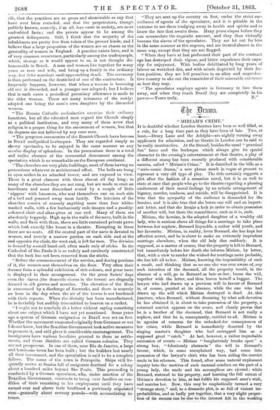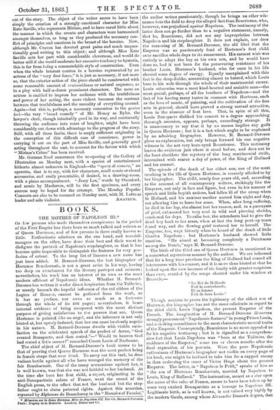ght Pula,
" MIRIAM'S CRIME "
IT is doubtful whether London theatres have been so well filled, as a rule, for a long time past as they have been of late. Two, at least,—Drury Lane and the Adelphi—are nightly turning away applicants for admission, and no theatre in London can be said to be really unattractive. At the Strand, besides the usual " practical fun" farce and the burlesque which always give its special character to the evening's entertainment at that theatre, a play of a different stamp has been recently produced with considerable success, called " Miriam's Crime." It is described in the bills as a "serio-comic drama," a new phrase much in vogue at present to represent a very old type of play. The title certainly suggests a plot after the fashion of a sensation novel, but it is as well to state at once that people who go to the theatre expecting a pleasing excitement of their moral feelings by an artistic arrangement of bigamy, murder, madness, and suicide, will be disappointed. It is true that the sympathy of the audience is demanded for the heroine, and it is also true that she burns one will and an import- ant letter, and that she breaks a leek jn.order to obtain possession of another will, but there the resemblance, such as it is, ends.
Miriam, the heroine, is the adopted daughter of a wealthy old lady, who is anxious above all things for a marriage to take place between her nephew, Bernard Reynolds, a rather wild youth, and her favourite. Miriam, in reality, loves Bernard, she has kept her affection secret, and he is about to make an extremely imprudent marriage elsewhere, when the old lady dies suddenly. It is supposed, as a matter of course, that the property is left to Bernard, but immediately before her death she informs Miriam, by letter, that, with a view to render the wished-for marriage more probable, she has left all to her. Miriam, knowing the impossibility of such a result, and thinking that as no one else was ever aware ofjany such intention of the deceased, all the property would, in the absence of a will, go to Bernard as heir-at-law, burns the will, together with the letter, and thus leaves herself a beggar. The lawyer who had drawn up a previous will in favour of Bernard is, of course, puzzled at its absence, while the one who had drawn up the will which Miriam destroyed is dead. At. this juncture, when Bernard, without dreaming by what self-devotion he has obtained it, is about to take possession of the property, a returned convict appears on the scene, and clearly proves that he is a brother of the deceased, that Bernard is not really a nephew, and that he is, consequently, entitled to all. Miriam is in agonies of remorse for the unlooked-for consequences of her crime, while Bernard is immediately deserted by the singing master's daughter who had entrapped him as a supposed great " catch." At last, however, a rather improbable succession of events — Miriam " burglariously breaks open " a strong box, " feloniously abstracts " the will in Bernard's favour, which, in some unexplained way, had come into possession of the lawyer's clerk who has been aiding the convict uncle in his schemes. This found, after some natural unpleasant inquiry into the motives of such unusual conduct on the part of a young lady, the uncle and his accomplices are ejected ; while Bernard, restored to his property, and learning the full extent of Miriam's devotion to him, at last fulfils his supposed aunt's wish, and marries her. Now, this may be emphatically termed a very "strange story," and, as a dramatic plot, is so full of violent im- probabilities, and so badly put together, that a very slight propor- tion of its success can be due to the interest felt in the working
out of the story. The object of the writer seems to have been simply the creation of a strongly- emotional character for Miss Kate Saville, who represents Miriam, and to have cared little about the manner in which the events and characters were harmonized amongst themselves, as long as they produced the necessary con- flict of principles and emotions in the breast of the heroine. Now, although Mr. Craven has devoted great pains and much unques- tionably good writing to this object ; and although Miss Kate Saville acts her part with considerable cleverness, and would do better still if she would moderate her excessive tendency to hysteria, this is far from being a commendable style of construction. Even when the whole interest centres in a heroine represented by an actress of the "very first force," it is just as necessary, if not more so, that the exterior action of the piece should be constructed with some reasonable amount of vraisemblance or natural sequence, as in a play with half-a-dozen prominent characters. The more an actress is enabled to impress her audience with the truthfulness and power of her acting, the more violent becomes the contrast between that truthfulness and the unreality of everything around. Again—but this is, perhaps, a necessary concession to the genius loci—the very " broad comedy " of Mr. Honey as Byles, the lavvyer's clerk, though inimitably good in its way, and continually throwing the audience into roars of laughter, might have been considerably cut down with advantage to the progress of the story. Still, with all these faults, there is amply sufficient originality in the conception of this difficult case of conscience, power in carrying it out on the part of Miss Saville, and generally good acting throughout the cast, to account for the favour with which " Miriam's Crime" has been received.
Mr. German Reed announces the re-opening of the Gallery of Illustration on Monday next, with a species of entertainment hitherto almost unknown in England—the "opera di camera," an operetta, that is to say, with few characters, small scenic or choral accessories, and easily presentable, if desired, in a drawing-room, with a piano accompaniment. "Jessy Lea," words by Oxenford, and music by Macfarren, will be the first specimen, and every success may be hoped for the attempt. The Monday Popular Concerts are also to be resumed on Monday next, with M. Lotto as































 Previous page
Previous page